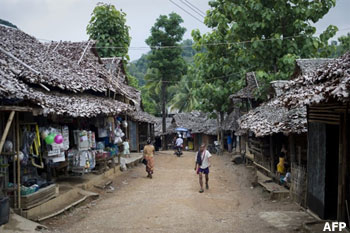Bangkok (Mizzima) – A sideline talk between the foreign ministers of Thailand and Burma has led Thailand to discuss plans to close down all nine refugee camps on its border, The Bangkok Post reported on Tuesday.
No official actions or date to begin the shut-down were approved. The Thai government said plans to provide training and skills to the refugees would be part of any plan.
 There are more than 140,000 refugees on the Thailand-Burma border, with some refugees living in the camps for more than 20 years.
There are more than 140,000 refugees on the Thailand-Burma border, with some refugees living in the camps for more than 20 years.
A spokesperson for Thai Foreign Minister Kasit Tiromya said: "The Thai government will help provide training in education and human resources development as well as improve their quality of life to prepare them to return to Burma so they can play constructive roles in their country’.
Thai Foreign Minister Kasit Piromya and newly-appointed Burmese Foreign Minister Wunna Maung Lwin discussed the issue during a meeting on the sidelines of the Special Informal Asean Foreign Ministers' meeting in Bangkok on Monday.
Spokesman Thani Thongpakdi quoted Kasit as saying that the Thai government would take part in running the administrative work in nine camps now managed largely by foreign non-government organisations, according to the newspaper. Thani said Burma Foreign Minister Lwin said Burma was ready to take the refugees back.
Thai National Security Council Chief Thawil Pliensri said the closure of the refugee camps was discussed at the agency's meeting on Monday chaired by Prime Minister Abhisit Vejjajiva.
‘I cannot say when we will close down the camps, but we intend to do it’, he said, according to the Bangkok Post. ‘We are now in the process of discussion with the Burmese government’.
The refugee camps, located in Tak, Mae Hong Son, Kanchanaburi and Ratchaburi provinces, are filled with members of Burma’s numerous ethic groups, many of whom have been in armed conflict with successive Burmese governments for up to four decades. Living conditions in the camps, which are largely self-operated and administered by international aid groups and the Thai government, are harsh. Refugees are not allowed to work or to leave the camps in normal circumstances.
A spokesperson for the UN Relief Agency in Bangkok said it was too soon to send the refugees home, according to the newspaper.
‘We have been working very well with the Thai government and we do understand that they don't want the refugees to stay here forever’, said Kitty McKinsey.
‘But the solution is not forcing people to go back to a country that is still dangerous. What we would really like to see is that the returns are done in safety and dignity, and they absolutely have to be voluntary’.


